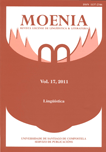‘Otra gente hallé que comían hombres: la desformidad de su gesto lo dize’: (re)visitando y revisando el caníbal en los escritos colombinos
Contenido principal del artículo
Resumen
Este trabajo (re)visita las descripciones y las referencias del caníbal en los escritos colombinos. Se examinan las complejidades y las contradicciones del discurso colonial así como la construcción del sujeto colonial de acuerdo con las ideologías mercantilistas y religiosas. Se consideran los discursos populares del entonces, los deseos personales y coloniales y la supuesta evidencia presentada por Colón y otros. Ante información de segunda mano, falta de evidencia física, fallos comunicativos, los escritos nos revelan el lado manipulador y, con frecuencia, contradictorio de la empresa de Colón. Por último, este estudio considera los cambios importantes en la narrativa que apuntan las necesarias maniobras religiosas y culturales en la apropiación del Otro, caníbal o no, que justifican los lucros personales y nacionales.
Palabras clave:
Detalles del artículo
Referencias
REFERENCIAS BIBLIOGRÁFICAS:
Arens, William (1979): The Man-Eating Myth. New York: Oxford UP.
Boucher, Philip P (1992): Cannibal Encounters. Europeans and Island Caribs 1492-1763. Baltimore: The John Hopkins UP.
Colón, Cristóbal (1982): Textos y documentos completos. Consuelo Varela (ed.). Madrid: Alianza.
Ferdman, Sandra (1994): “Conquering Marvels: The Marvelous Other in the Texts of Christopher Columbus.” Hispanic Review, 62:4, 487-496.
Greenblatt, Stephen (1991): Marvelous Possessions. Chicago: The Chicago UP.
Greenblatt, Stephen (2005): Renaissance Self-Fashioning: from More to Shakespeare. Chicago: University of Chicago Press.
Hart, Jonathan (1994): “Images of the Native in Renaissance Encounter Narratives.” A Review of International English Literature, 25:4, 55-76.
Hulme, Peter (1986): Colonial Encounters. Europe and the Native Caribbean 1492-1797. London and New York: Metheuem.
Hulme, Peter (1994): “Tales of Distinction: European Ethnography and the Caribbean.” Implicit Understandings. Observing, Reporting, and Reflecting on the Encounters Between Europeans and other Peoples in the Early Modern Era. Stuart B. Schwartz (ed.). Cambridge [England]; New York, NY: Cambridge UP. 157-197.
Hulme, Peter (1998): “Introduction: the Cannibal Scene.” Cannibalism and the Colonial World. Francis Baker, Peter Hulme and Margaret Iversen (eds.). Cambridge: Cambridge UP.
Johar, K. L. (1988): Christopher Marlowe: a Study in the Renaissance Concept of Heroism. Meerut: Shalabh Prakashan.
Phelan, John Leddy (1970): The Millennial Kingdom of the Franciscans in the New World. 2nd ed. Berkeley and Los Angeles: U. of California P.
Sale, Kirkpatrick (1990): The Conquest of Paradise. New York: Alfred A. Knopf.
Simões, Manuel (1985): A Literatura de Viagens nos Séculos XVI e XVII. Lisbon: Comunicação.
Todorov, Tzvetan (1999): The Conquest of America. The Question of the Other. Richard Howard (trad.). Norman: U. of Oklahoma P.
Wey-Gómez, Nicolás (1992): “Cannibalism as Defacement: Columbus’s Account of the Fourth Voyage.” Journal of Hispanic Philology, (16:2), 195-208.
Wey-Gómez, Nicolás (2007): “A Poetics of Dismemberment: the Book of Job and the Cannibals of Cariay in Columbus’s Account of the Fourth Voyage.” Colonial Latin American Review, (16:1), 109-123.
Whitehead, Neil L. (1984): “Carib Cannibalism. The Historical Evidence.” Journal de la Société des Americanistes (70), 69-87.
Zamora, Margarita (1992): “Reading in the Margins of Columbus.” Amerindian Images and the Legacy of Columbus. Eds. René Jara y Nicholas Spadaccini. Minneapolis: U.of Minnesota P. 183-197.
Zamora, Margarita (1993): Reading Columbus. Berkeley: U. of California P.
Artículos más leídos del mismo autor/a(s)
- Maria João Dodman, Notions of Man and Manhood in Seventeenth-century Iberia: the Nobleman of "La margarita del Tajo que dio nombre a Santaren" of Ángela de Avezedo , Moenia: Vol. 18 (2012)


